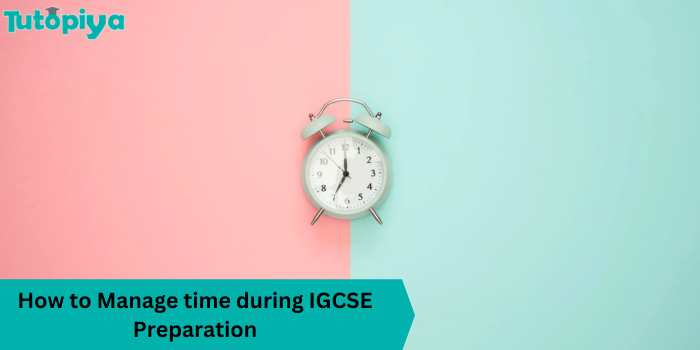- Conquer your IGCSE exams with expert tips! Master time management, identify strengths & weaknesses, build a winning study schedule.
Ace Your IGCSE Exams: Master Time Management & Conquer Stress
Hey there! Getting ready for your IGCSE exams can be quite a task, but with the right time management, you can make the process a lot smoother. It’s all about finding that balance between studying, relaxation, and other activities.
By managing your time effectively, you can make the most of your preparation without feeling overwhelmed.
In this guide, we’ll explore some practical tips and strategies to help you manage your time during IGCSE preparation. Whether it’s finding the best study schedule, incorporating breaks, or staying organized, we’ve got you covered. So, let’s dive in and make your IGCSE prep an efficient and enjoyable experience!
Overview of IGCSE exams
Students often take the International General Certificate of Secondary Education (IGCSE) exams at the conclusion of their secondary education to earn an internationally recognised qualification. These tests are comparable to the UK’s GCSE exams and are provided by the Cambridge Assessment International Education board.
Numerous subjects are included in the IGCSE exams, such as languages, the sciences, the humanities, and more. They are intended to evaluate a student’s comprehension and knowledge of the relevant disciplines as well as their application of that knowledge to practical settings.
The tests are renowned for being demanding and thorough, and passing them can lead to chances for higher study and employment. Examining for IGCSEs can be a rewarding experience if done properly and with preparation, paving the way for future academic and professional success.
Must Read: Master the IGCSE: Your Complete Guide to Success
Importance of effective time management during preparation
Effective time management during IGCSE preparation is crucial for several reasons:
Comprehensive Coverage: IGCSE exams cover a wide range of subjects, demanding thorough preparation. Effective time management allows students to allocate sufficient time to each subject, ensuring comprehensive coverage and understanding.
Stress Reduction: Proper time management helps in creating a balanced study schedule, reducing the likelihood of feeling overwhelmed by the volume of material to be covered. This, in turn, can alleviate stress and anxiety during the preparation period.
Enhanced Performance: When time is managed effectively, students can dedicate time not only to studying but also to relaxation and extracurricular activities. This holistic approach can lead to enhanced focus, better retention of information, and improved overall performance in the exams.
Identifying Exam Subjects and Topics
Absolutely, identifying the specific subjects and topics within the IGCSE curriculum is essential for efficient time management. The IGCSE exams typically cover a broad spectrum of subjects, including languages, sciences, humanities, and more.
Each subject has its own set of topics and subtopics, which require dedicated study time. By understanding the scope of each subject and the depth of knowledge required, students can effectively distribute their time, ensuring comprehensive coverage and understanding.
Must Read: IGCSE Singapore: Find the best Resources for IGCSE Exams
Establishing realistic study goals
Establishing realistic study goals is crucial for effective IGCSE Exam preparation. Here are four key points to consider when setting study goals:
Subject-Based Goals: Identify the subjects you need to study for the IGCSE exams and set specific goals for each. Break down the topics within each subject and create a study plan that allocates time for each area of study.
Time-Bound Goals: Set realistic timelines for achieving your study goals. Consider the amount of time available before the exams and distribute your study goals accordingly, ensuring that you allow ample time for revision and practice.
Measurable Progress: Establish goals that are measurable, allowing you to track your progress. This could involve completing a certain number of practice questions, mastering specific concepts, or achieving target scores on practice tests.
Flexibility: While it’s important to set specific goals, it’s also essential to be flexible. Be prepared to adjust your goals based on your progress and any unexpected challenges that may arise during your preparation.
Creating a Study Schedule and Balancing study sessions with breaks
To effectively prepare for the IGCSE exam, a study strategy that balances study periods with breaks must be created. When creating a study timetable, keep the following elements in mind:
Time management: Set aside specified periods of time for every subject, taking into account both its significance and your level of expertise. To have a balanced approach, make sure to split up your study periods equally among the many subjects.
Rest & Breaks: To keep your attention and prevent burnout, plan regular, brief breaks during your study time. Taking pauses gives your brain a respite and improves information retention for when you go back to studying.
Active Study Techniques: Plan to incorporate active study techniques such as practice tests, flashcards, and summarizing key concepts into your study schedule. These techniques can enhance retention and understanding of the material.
Multisensory Learning: Consider incorporating a variety of study methods that engage different senses, such as reading, writing, listening, and visualizing. This can help cater to different learning styles and improve overall comprehension.
Prioritizing Subjects
It is crucial to take into account your own skills and weaknesses in each topic when choosing which ones to prioritize in your study schedule. You might wish to devote more time to subjects that you find more difficult or that are more important in the test.
Take into account the exam timetable as well and give courses that are closer together more time. By considering these variables, you can design a well-rounded study schedule that guarantees in-depth preparation for every subject.
Must Read: Top 10 Secrets for IGCSE Exam Success: Expert Training and Guidance
Identifying strengths and weaknesses
Identifying strengths and weaknesses in each subject is crucial when creating a study schedule for the IGCSE exams. Here are five points to consider when assessing your skills and areas for improvement:
Self-Assessment: Reflect on your performance in past assessments, homework, and class participation to identify subjects where you excel and areas where you struggle.
Feedback from Teachers: Seek feedback from your teachers on your performance in different subjects to gain insight into your strengths and weaknesses.
Mock Exams: Take mock exams or practice tests to gauge your proficiency in various subjects and identify areas that require more attention.
Study Groups: Collaborate with peers to discuss and compare your understanding of different subjects, which can help you identify areas where you may need more support.
Personal Interest: Consider your personal interest and motivation in each subject, as this can impact your focus and willingness to dedicate time for in-depth study.
By considering these points, you can effectively identify your strengths and weaknesses, allowing you to tailor your study schedule to address areas that need improvement while leveraging your strengths.
Ensuring a balanced approach to all subjects and Utilizing Productive Study Techniques
When gearing up for the IGCSE exams, it’s crucial to allocate additional time to challenging subjects while maintaining a balanced approach across all subjects.
By dedicating extra time to challenging topics, you can delve deeper into the material, seek additional resources, and clarify any areas of confusion. This targeted effort ensures a more comprehensive understanding of the subject matter.
Simultaneously, it’s important to maintain equilibrium across all subjects, preventing neglect of any particular area. This balanced approach can be achieved through careful time management and prioritization, allowing for adequate attention to each subject without sacrificing depth of understanding.
By striking this balance, you can optimize your study schedule, effectively addressing weak areas while reinforcing your strengths, ultimately leading to a well-rounded preparation for the IGCSE exams.
Conclusion
In conclusion, preparing for the IGCSE exams requires a strategic and balanced approach. Allocating additional time to challenging subjects while maintaining a comprehensive focus across all areas is essential. By doing so, students can deepen their understanding of complex topics and prevent neglect of any particular subject.
Through careful time management and prioritization, a balance can be achieved, ensuring that each subject receives the necessary attention without sacrificing depth of comprehension. This approach allows students to optimize their study schedules, effectively addressing weaknesses while reinforcing their strengths.
Ultimately, this balanced strategy leads to a well-rounded preparation for the IGCSE exams, empowering students to approach the assessments with confidence and proficiency across all subject areas.
Pankaj Dhiman
With over 6 years of experience in SEO, this expert specializes in achieving outstanding ranking results through a blend of on-page, off-page, and technical SEO techniques. Bringing deep knowledge of SEO strategies, algorithms, and trends, they excel at boosting organic visibility and driving high-quality traffic. Additionally skilled in content writing, they create engaging, SEO-optimized content that enhances site performance and aligns seamlessly with search engine optimization efforts for holistic success.





